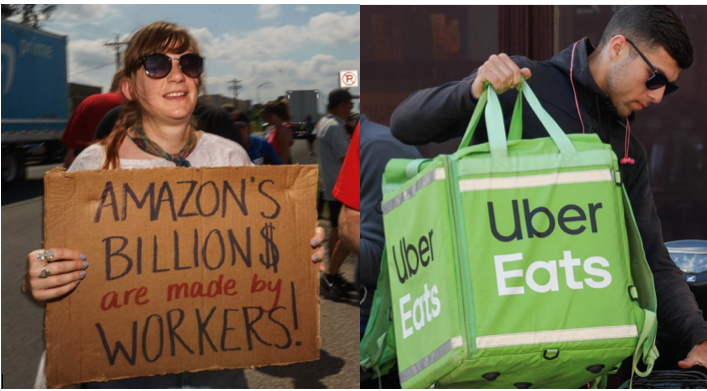CommentsDEEGAN ON LA-A relatively new category of low-wage independent contract workers -- the “gig” workers -- are on the front lines of suffering as their employers, giants like Amazon/Whole Foods and Instacart, resist demands to give them major benefits.
The workers are threatening walkouts, strikes and unionization, and receiving backing from a range of left-leaning supporters including Bernie Sanders who told his 11.6 million Twitter followers that “A company of this size should not be forcing its workers to put themselves — and us all — at risk. I stand with the workers and encourage Instacart to meet their demands.”
Their demands are hefty but not unreasonable, including:
- Paid leave for all workers who self-quarantine.
- Hazard pay that would double store workers’ hourly wage over the course of the crisis.
- An increase to 10% from 5% for the default tip built into an order.
- More sanitation supplies and social distancing policies.
- Free coronavirus testing for workers.
- If a worker tests positive, they want the store where the employee works to be closed immediately and remain closed while all other employees at that location are tested.
As independent contractors, these gig workers do not have to work a minimum number of hours to qualify for the benefits they are asking for. One grocery delivery a week for Instacart fully qualifies a worker for benefits like paid leave if they self-quarantine.
This is the offsetting fact to an otherwise solid argument. The corporate burden to give benefits to “onesies” workers may be seen as unfair. While there may be a minimum wage, there’s no minimum work requirement for a gig worker to be classified as a recipient of benefits -- a loophole that could be costly for corporations.
Gig workers are independent contractors that provide services to the company’s clients. Uber takes you where you want to go or can be used to deliver a hot meal to you. Instacart shops for your groceries and delivers them to you. Of all the gig workers, Amazon/Whole Foods and Instacart have become the most familiar, especially the in-demand Instacart, as people stay at home and pay a premium for someone else to do their shopping in the petri dishes that grocery stores may have turned into.
Instacart, Doordash, Postmates, Caviar, Lime Bike, Lyft and Uber are just some of the gig workers that do for us what we do not want to do, or cannot do, for ourselves. They, and the others who keep us going, have been saluted by many. Typical is the thumbs-up in Barack Obama’s statement to his 115 million Twitter followers that “During this crisis, our grocery store clerks, delivery drivers, transit and utility workers—along with so many others—have been selflessly getting up every day to make sure we have the things we need. And for that, we say thank you.”
In the gig economy, workers do not have full-time or part-time jobs with defined hours and benefits. They have the flexibility of using digital platforms to alert them to work opportunities and the option to accept or decline the request. That is the difference between having a “job” and having a “gig.”
There is no regulation or standardization of the gig workforce, but the Covid-19 pandemic is shining a light on a clear inequality: gig workers are at the same level of risk exposure as first responders, grocery clerks, bus drivers, EMTs, firefighters, and cops on the beat. Many gig workers are invisible but highly essential in the logistics of getting food from the fields and farms to the warehouses, grocery stores and kitchens.
Gig workers have been walking out on the job and staging other protests. Reactions from the strike and walkout targets -- Instacart and Amazon/Whole Foods -- have been what we would expect from corporate America.
Instacart has said the labor actions are having “absolutely no impact on Instacart’s operations,” claiming it has been selling more groceries “than ever before.” They are also trying to hire 300,000 new gig workers.
Amazon/Whole Foods has been similarly upbeat about labor worries, saying it has had "no operational impact" and service has continued at "all of our stores without interruption." Amazon is trying to hire 100,000 new warehouse and delivery drivers.
Something to look forward to is May 1 -- International Workers' Day, aka May Day -- celebrating workers and laborers. Widespread worker actions and reactions may be expected at that time.
(Tim Deegan is a civic activist whose DEEGAN ON LA weekly column about city planning, new urbanism, the environment, and the homeless appears in CityWatch. Tim can be reached at [email protected].) Edited for CityWatch by Linda Abrams.















